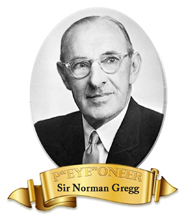
Unchartered Territory: Sir Norman Gregg
Our P"eye”oneer spotlight today is on Sir Norman Gregg.
Norman McAlister Gregg was born in Sydney in 1892 and graduated from the University of Sydney in 1915 with honors. He served as a Captain Royal Army Medical Corps on the western front in WWI. After the war, he studied ophthalmology in London and returned to Sydney where he worked at the Prince Alfred Hospital and the Royal Alexandra Hospital for Children, where he later became president, as well as in private practice. He was also President of the Children’s Medical Research Foundation.
Dr. Gregg became alarmed at the number of babies he attended to with congenital cataract, at least 2-3 times more than what would be expected by heredity alone. He overheard two mothers speak outside his office, who both had affected babies. They were discussing how both had had German measles (rubella) in pregnancy. Out of the 78 children born in the early months of 1941 who went to see a doctor in Australia for cataract (13 in his own office), 68 had been exposed to Rubella in utero. He gathered epidemiological evidence from his own practice and cases of other ophthalmologists and drew the conclusion that children exposed to rubella virus in utero during the first trimester of pregnancy are at risk for not just cataract, but also deafness and other severe problems. However, his findings were not immediately accepted; it was not until 1961, two decades after Norman’s initial findings, that research scientists were able to isolate the rubella virus. When there was a worldwide outbreak of rubella in 1964, resulting in 20,000 cases of congenital cataract in the United States alone, a vaccine was developed. Norman’s discovery also stimulated rapid development of the fledgling field of teratology, the study of birth defects and their causes.
Gregg was widely honored throughout his lifetime. He was knighted in 1953. In 1963, he was elected an Honorary Fellow of the Australian Postgraduate Federation in Medicine, and in 1964 the Encyclopedia Britannica Award for the most outstanding achievement of medical research in Australia. At the University of Sydney his work is commemorated by the naming of the Norman Gregg Lecture Theatre. He passed away in 1968.
Credits: British Journal of Ophthalmology, Nov. 1966. Sydney Medical School Online Museum and Archive Home
Have a thought about this article? Contact Us and let us know.